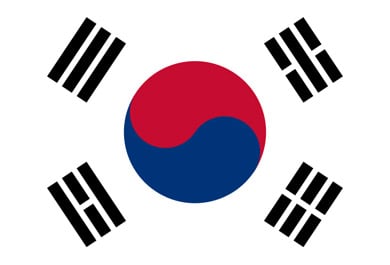- South Korea Provinces - Daegu (Taegu), Daejeon (Taejon), Gangwon, Gwangju, Gyeonggi, Incheon, Jeju (Jeju-do), North Chungcheong (Chungcheongbuk-do), North Gyeongsang (Gyeongsangbuk-do), North Jeolla (Jeollabuk-do), Sejong, Seoul Metropolitan, South Chungcheong (Chungcheongnam-do), South Gyeongsang (Gyeongsangnam-do), South Jeolla (Jeollanam-do), Ulsan
- Neighboring Countries - North Korea, Japan, China
- Continent And Regions - Asia Map
- Other South Korea Maps - South Korea Map, Where is South Korea, South Korea Blank Map, South Korea Road Map, South Korea Rail Map, South Korea River Map, South Korea Cities Map, South Korea Political Map, South Korea Physical Map
Download Picture of South Korea Flag Outline for kids to color
Introduction
The flag of Republic of Korea or South Korea is also known as Taegeukgi. The ensign has three segments – a white field; a blue and red taegeuk in the middle; and four black three-letter figures, one in every angle of the ensign.
The common layout of the ensign also originates from the conventional application of the tricolor emblem (yellow, blue, and red) by the people of Korea, from the initial phases of the chronicles of Korea. The white field stands for “purity of the people.” The Taegeuk symbolizes the source of all objects in the universe. Collectively, they stand for an uninterrupted progress in eternity.
Conventionally, the four trigrams are associated with water, fire, wood, earth, and metal – the five fundamental elements. This concept has parallels with the four conventional elements of the West.
Protocol
The flag is hoisted on all national events in South Korea.
History
The Republic of Korea flag was officially approved on July 12, 1948. It was planned by Young-Hyo Park and initially approved as an insignia by the Korean Empire in 1882. The ensign was proscribed throughout the period of settlement. The Taegeuk acted as an icon of confrontation and sovereignty throughout that period, and possession of it was liable to be punished by death penalty.
Following freedom, both North and South Korea originally assumed editions of the Taegeuk. However, North Korea modified its official ensign to a layout influenced by the flag of the Soviet Union after three years. The Republic of Korea Constituent Assembly formally approved the Taegeuk as the official ensign on July 12, 1948. Once the Government of the Republic of Korea was founded, “The Rules for the flag of the Republic of Korea” were first ratified.
| National symbol(s): | taegeuk (yin yang symbol), Hibiscus syriacus (Rose of Sharon) |
| National colors: | red, white, blue, black |
| National anthem: | |
| Name: | “Aegukga” (Patriotic Song) |
| Lyrics/Music: | YUN Ch’i-Ho or AN Ch’ang-Ho/AHN Eaktay |
Fact about Korea, Republic of (South Korea) flag |
| Country | Korea, Republic of (South Korea) |
|---|---|
| Designed by | NA |
| Adopted | January 27, 1883 (original version used by the Korean Empire), October 1997 (current version) |
| Revision | NA |
| Design and Colors | a white background, a red and blue Taeguk in the center, and four black trigrams, which are selected from the original eight, on each corner of the flag. |
| Size Ratio | 3:2 |

